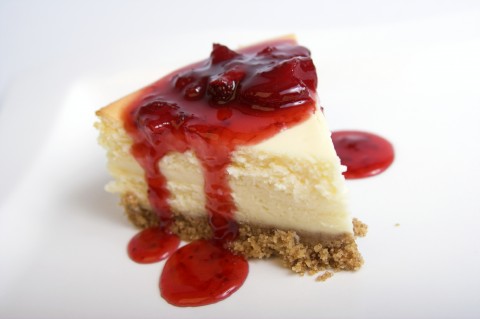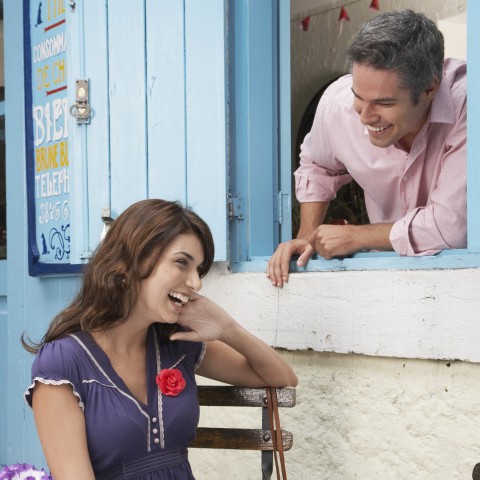Jeter des fleurs à quelqu’un. (“To compliment someone.” Or literally: “To throw flowers at someone.” )
Ever wonder how to compliment a guy in French or give your compliments to the chef after a delicious meal? If you haven’t heard compliments in French before, it may be because the French don’t do this much and tend to keep their praise a bit too much to themselves.
When I traveled to Japan with a bunch of French friends, we were stunned at how people would praise us for everything we were doing, laugh at our most wonky jokes, and compliment us at every corner on our accents, clothes, or even our choices of drinks. People would strongly react with round eyes, laughter, and what seemed to me like a general tendency to exaggerate their feelings.
I got a similar impression later about Americans, then about Colombians, and it got me thinking: Are we, Europeans, such emotionless logs, sitting in silence with a straight face and dead eyes, that we are unable to see beauty and excitement in the smallest of things like our foreign counterparts do? How deep does this phlegm of ours go?
The French are known to be sparing with their compliments, but they usually mean every single word when they do give one. You might not get much praise from them, but when you do, you’ll know it means something and it’s not overacted. It will convey just the level of enthusiasm they think it deserves, or probably less because we can also be emotionless logs. But don’t hold it against us!
- Good Job!
- Complimenting Someone’s Look
- Complimenting the Mind
- This is Amazing!
- What Comes After a Compliment
- Compliments and the French Culture of Seduction
- Le Mot De La Fin
1. Good Job!
One situation where you’d compliment someone is to praise them for doing a good job on something.
Whether you’re at work or home, a job well done deserves some appreciation. Although more reserved than some in this department, your French colleagues or friends shouldn’t fail to reward the quality of your work with some nice words.
Here are some common French compliments for a job well done:
- Bien joué ! (“Well done!” Literally: “Well played!” )
- Bon travail. (“Good work.” )
- C’est du bon boulot. / C’est du bon travail. (“It’s good work.” )
- Excellent travail. (“Excellent work.” )
And here’s how to compliment them on their awards or achievements:
- Félicitations ! (“Congratulations!” )
- Toutes mes félicitations. (“My congratulations.” )
- Tu l’as bien mérité ! (“You’ve earned it!” or “You deserve it!” )
You don’t have to blindly follow the average French mindset. I’m personally trying to follow Dale Carnegie’s precept: “Be hearty in your approbation and lavish in your praise.” By praising whenever you can, even for small wins, you’ll make a strong impression on the French people you’re socializing with, as they’ll get more appreciation from you than they’d expect.
Bon travail ! (“Good work!” )
2. Complimenting Someone’s Look
If there’s one situation where the French don’t keep their tongue in their pocket, it’s when it comes to flirting, seduction, or praising their partner. Whether seeking pleasure or romance, this is when we could actually over-express our feelings and get carried away.
For now, let’s be superficial and see how to compliment someone in French for their good looks:
- Tu es beau. (“You are handsome.” ) [Male]
- Tu es belle. (“You are beautiful.” ) [Female]
Don’t forget that French adjectives need to agree with the subject. In most cases, the adjective’s ending will simply change, as in:
- Tu es charmant. (“You are charming.” ) [Male]
- Tu es charmante. (“You are charming.” ) [Female]
But there are some cases, such as with beau and belle, where the two words are different.
-
→ You can find more on adjectives and how they work in our Complete Guide to French Adjectives on FrenchPod101.com.
With the same structure, you can make many more compliments:
- Tu es magnifique / superbe / élégant(e) / classe.
(“Wonderful,” “Superb,” “Elegant,” “Classy” )
We could go on for quite some time!
These are very general compliments, so let’s get more specific:
- Tu as de beaux yeux. (“You have beautiful eyes.” )
- Tu as de beaux cheveux. (“You have beautiful hair.” )
- Tu as de belles mains. (“You have beautiful hands.” )
Technically, you can compliment on whatever you want, but some body parts are more popular targets and complimenting someone on their elbows or earlobes might raise a few eyebrows. Don’t let that keep you from doing it, though, if you ever meet someone whose amazing elbows leave you speechless!
It’s always nice to be complimented on your body, but unless it’s aimed at your hard-earned muscles or surgically fixed nose, chances are you haven’t done anything to deserve the praise. What about when we switch to something else?
- J’aime bien tes chaussures. (“I like your shoes.” )
- J’aime beaucoup ton maquillage. (“I really like your makeup.” )
- J’adore ta robe ! (“I love your dress!” )
- Ce chapeau te va très bien. (“This hat suits you very well.” )
- Tes lunettes sont super cool ! (“Your glasses are super-cool!” )
- Je veux le même t-shirt ! (“I want the same T-shirt!” )
Young and middle-aged French men are wearing lots of printed T-shirts where they can display their favorite comic characters, movie posters, video game artwork, as well as countless pop culture references. For example, if I’m wearing my Godzilla T-shirt and one of my coworkers comments on it with a subtle reference or clever remark, it instantly creates a connection, as we’re bonding over our common tastes in entertainment.
Tu as une très belle barbe. (“You have a very beautiful beard.” )
3. Complimenting the Mind
Enough with the superficial compliments! Sure, everyone likes to be appreciated for their appearance, but we also want our minds to be praised! Let’s see some of the best French compliments regarding someone’s intellect or skills.
Tu es intelligent. (“You’re intelligent.” )
Tu es malin / futé. (“You’re smart / clever.” )
There are many other words you can use, such as:
- Intéressant (“Interesting” )
- Perspicace (“Insightful” )
- Drôle (“Funny” )
- Cultivé (“Cultured” )
- Gentil (“Kind” )
- Sympa (“Nice” )
- Adorable (“Adorable” )
You can also compliment people on their skills with simple structures like:
Tu _____ bien. (“You ____ well.” )
- Tu chantes bien. (“You sing well.” )
- Tu écris assez bien. (“You write rather well.” )
- Tu cuisines très bien. (“You cook very well.” )
- Tu dessines vraiment bien. (“You draw really well.” )
Tu as une bonne / belle ______. (“You have a good / beautiful ____.” )
- Tu as une bonne conduite. (“You have a good driving style.” )
- Tu as un bon style. (“You have a good style.” )
- Tu as une belle écriture. (“You have beautiful writing.” )
Tu danses bien ! (“You’re a good dancer!” )
4. This is Amazing!
When you compliment a thing, you’re often indirectly praising a person. When you’re in awe of the food, you’re praising the cook; when you fall in love with a song, all credit goes to the artist.
Here are the most useful words and sentences to share that you like something:
- C’est bien. (“It’s good.” )
- C’est bon. (“It’s good.” Mainly used to mean “it tastes good” or “it feels good.” )
- C’est magnifique. (“It’s wonderful.” )
- C’est magique ! (“It’s magical!” )
- C’est intéressant / passionnant / divertissant. (“It’s interesting / fascinating / entertaining.” )
Don’t leave the cook hanging. Let’s see more French compliments for food:
- C’était très bon. (“It was very good.” )
- C’est délicieux. (“It’s delicious.” )
- C’est vraiment excellent. (“It’s really excellent.” )
- Ça a l’air délicieux. (“It looks delicious.” )
- Ça sent très bon. (“It smells very good.” )
- Mes compliments au chef. (“My compliments to the chef.” )
In France, we joke about the fact that burping is a way to show your appreciation for the food, but unless you’re among friends in a private environment, you should certainly refrain from letting it out.
-
→ Learn more about table manners in our Complete Guide on French Etiquette.
And here are some mild compliments for when you’re satisfied, but not impressed:
- C’est sympa. (“It’s nice.” )
- C’est pas mal. (“It’s okay.” )
- C’est pas pire. (“It’s okay.” Quebec only.)
- C’est pas dégueu. (“It’s not bad.” [Familiar] Originally about food, but we use it figuratively for any other thing.)
Ça a l’air très bon ! (“It looks delicious!” )
5. What Comes After a Compliment
Complimenting is often a two-way street and there are some social norms for the aftermath.
How should you say “thank you”? What do you answer after someone thanks you for your compliment? Should you deflect compliments? Everything will be answered in this chapter.
1 – Express Your Gratitude
The easiest thing you can do after a compliment is to accept it and thank the complimenter. Look the person in the eyes, smile, say “thank you,” and you’ll be fine! (Yes, I’m also teaching you how to look human, in case you’re an android or a disguised alien.)
- Merci ! (“Thank you!” )
- Merci beaucoup. (“Thank you very much.” )
What if you compliment someone and receive a merci?
- De rien ! (“You’re welcome!” Literally: “of nothing” )
- Je t’en prie. (“You’re welcome.” Literally: “I pray you for it.” )
2 – Answer with Another Compliment
This is the equivalent of answering “What’s up?” with “How are you doing?” but it’s still perfectly acceptable.
Complimenting someone back in French is the same as in English. You can either answer with a simple “you too” or try and be more creative.
For example:
- Tu as de très beaux yeux. (“You have very beautiful eyes.” )
Toi aussi. [Casual] / Vous aussi. [Formal] (“You too!” ) - J’adore ton t-shirt ! (“I love your T-shirt!” )
Merci, mais je ne peux pas rivaliser avec ta chemise. (“Thank you, but I can’t compete with your shirt.” )
-
→ Make sure to visit our vocabulary list on The Top 15 Compliments You Always Want to Hear, with audio recordings to practice your pronunciation. It’s freely available on FrenchPod101.com.
3 – Don’t Deny Compliments or Demean Yourself
Another way to react to a compliment is to deny it by explaining why you don’t deserve it. It usually sounds awkward and may be insulting to the complimenter, so obviously, I would not recommend it. But here’s how it would sound in French:
- J’adore ton t-shirt ! (“I love your T-shirt!” )
C’est juste un vieux truc que je porte pour dormir. (“It’s just an old rag I sleep with.” ) - Très bon travail, ton script. (“Very good work on your script.” )
Je trouve ça plutôt ennuyeux, mais merci. (“I find it rather boring, but thank you.” )
In general, you should embrace the compliment and accept it with modesty. Don’t undermine the compliment with phrases such as:
- Oh non, c’est rien. (“Oh no, it’s no big deal.” )
- Non, ce n’était vraiment rien. (“No, but it was nothing.” )
4 – Share the Credit
If you ever answer with a compliment, do it genuinely, without entering a compliment battle.
However, you can give credit where it’s due, and accept the compliment while sharing the credit with your team or contributors. For example:
- Rien de tout ça n’aurait été possible sans mon équipe. (“None of this would have been possible without my team.” )
– Tu as de beaux cheveux. (“You have beautiful hair.” )
Toi aussi. (“You too.” )
– …
6. Compliments and the French Culture of Seduction
1 – Complimenting VS Showing Interest
It’s always nice to receive compliments, but what most of the French really want (besides eternal life and free cookies) is to generate interest and curiosity. If you’re hitting on a guy with a beautiful beard, don’t compliment him on his beard; he’s heard that one countless times.
You should go for something original and unpredictable, or even better: Skip the compliment entirely and just show your interest in whatever he’s doing, what he likes, his values, his core beliefs, or his favorite Star Wars characters. Anything, as long as it’s meaningful to both of you.
Especially in Paris, French girls get a lot of hassle from the sad crowd of wannabe Don Juans loitering in the streets and metro stations. As a result, compliments are just not as well-received as they used to be. Unspoken compliments, such as an eloquent stare, a smile, or a sincere show of interest can go a much longer way.
2 – The “Negs Hit,” a French Pickup Technique
Disclaimer: I’m not advocating pickup techniques in general, but I find this one culturally interesting.
Popularized by self-proclaimed “Pick-Up Artist” Erik Von Markovik, the Negs Hit is a negative comment aimed at your target (usually a girl you want to seduce) to destabilize her and get her to lower her guard.
It’s usually aimed toward girls with high self-esteem, if they get overly defensive at your approach. Using Negs Hits with someone who’s already into you and opening up would be counter-productive.
A Negs Hit is not supposed to be insulting or hurtful, and should not target any major flaw the person is likely to have a complex about. It’s a slightly embarrassing and seemingly innocent comment you’d make on a flaw in her looks or behavior. By doing so, you communicate that you’re not impressed with her desirability and that you’re not interested in her as a potential partner.
It’s supposed to create curiosity and interest toward you, as well as lower her guard for the moment you’d choose to switch to a more traditional seductive approach, should you decide to do so. I personally think it should just be called “having a sense of humor,” and it works wonders to filter people out who don’t have one, as they’ll get angry at your comment and walk away.
Jolie coiffure ! C’est une perruque ? (“Nice hairstyle! Is it a wig?” )
7. Le Mot De La Fin
In this guide, you’ve learned everything about French compliments: how to compliment a guy or a girl, how to cheer the chef, and even how to flirt in French. You’ve also learned many praise words in French and how to put them together. Did I forget any important compliment you’d like to know about? Do you feel ready to express your appreciation and gratitude using everything we’ve learned today?
FrenchPod101 also has tons of vocabulary lists with audio recordings and free resources to boost your studies and keep your French learning fresh and entertaining!
Remember that you can also use our premium service, MyTeacher, to get personal one-on-one coaching and have your private teacher help you practice compliments and more, using assignments, personalized exercises, and recorded audio samples for you. Your teacher can also review your audio recordings to help improve your pronunciation.
Happy learning on FrenchPod101.com!
About the Author: Born and bred in the rainy north of France, Cyril Danon has been bouncing off various jobs before he left everything behind to wander around the wonders of the World. Now, after quenching his wanderlust for the last few years, he’s eager to share his passion for languages.


















